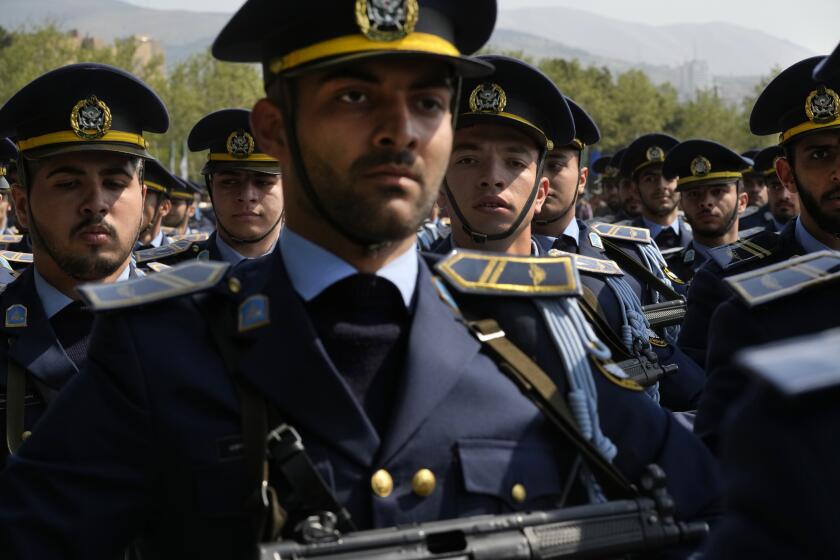Iran’s supreme leader threatens Israel and U.S. with ‘a crushing response’ over attacks by Israel

- Share via
DUBAI — Iran’s supreme leader on Saturday threatened Israel and the U.S. with “a crushing response” over attacks on Iran and its allies.
Ayatollah Ali Khamenei spoke as Iranian officials are increasingly threatening to launch yet another strike against Israel after its Oct. 26 attack on the Islamic Republic that targeted military bases and other locations and killed at least five people.
Any further attacks from either side could engulf the wider Middle East, already teetering over the Israel-Hamas war in the Gaza Strip and Israel’s ground invasion of Lebanon, into a wider regional conflict just ahead of the U.S. presidential election Tuesday.
“The enemies, whether the Zionist regime or the United States of America, will definitely receive a crushing response to what they are doing to Iran and the Iranian nation and to the resistance front,” Khamenei said in video released by Iranian state media.
The 85-year-old Khamenei had struck a more cautious approach in earlier remarks; he did not elaborate on the timing of the threatened attack, nor the scope. Iran has launched two major direct attacks on Israel, in April and October. The U.S. military operates on bases throughout the Middle East, with some troops now manning a Terminal High Altitude Area Defense, or THAAD, battery in Israel.
War in the Middle East risks escalation yet again as Israel bombed targets in Iran in a spiraling pattern of attack and retaliation inflaming the region.
The USS Abraham Lincoln aircraft carrier probably is in the Arabian Sea, and Pentagon spokesman Maj. Gen. Pat Ryder said Friday that more destroyers, fighter squadrons, tankers and B-52 long-range bombers would be coming to the region to deter Iran and its militant allies.
Iran’s allies, called the axis of resistance by Tehran, have been damaged by Israeli attacks, particularly Lebanon’s Hezbollah and Hamas in the Gaza Strip. Iran long has used those groups as both an asymmetrical way to attack Israel and as a shield against a direct assault.
Here’s a look at the so-called Axis of Resistance, an Iran-backed coalition including Hezbollah, Hamas and other militant groups devoted to destroying Israel.
In north Lebanon, Israel’s naval forces captured a senior Hezbollah operative, an Israeli military official said Saturday. Lebanese authorities had said they were investigating whether Israel was behind a Lebanese sea captain’s capture by a group of armed men near the town of Batroun on Friday.
The conflict between Hezbollah and Israel escalated in late September. Since then, Israeli forces began a ground invasion of southern Lebanon and intensified airstrikes across the country, including southern Beirut and the eastern Bekaa Valley, killing most of Hezbollah’s senior commanders.
Israel routinely turned aside U.S. requests regarding Gaza and Lebanon, but the attack on Iran was different.
In central Israel on Saturday, a strike fired from Lebanon hit a building in the predominantly Israeli Arab town of Tira, injuring 11 people, according to the Magen David Adom emergency service. Hezbollah said it used missiles and explosive drones to target military and intelligence facilities.
Meanwhile, an Israeli airstrike on a southern suburb of Beirut on Saturday afternoon wounded 11 people, the Lebanese health ministry said.
In Gaza, Israeli strikes on Nuseirat refugee camp killed at least 42 people, more than half of them women and children, in 24 hours, said Dr. Marwan Abu Naser, director of Al Awda Hospital. An additional 150 were wounded, he said.
Israel’s war in Gaza has killed more than 43,000 Palestinians since Oct. 7, 2023, when Hamas militants killed roughly 1,200 people in Israel and took some 250 hostages back to Gaza. Health officials inside Hamas-run Gaza do not distinguish between civilians and combatants, but say more than half of the dead in the enclave are women and children.
Gambrell writes for the Associated Press. AP journalists Adam Schreck in Jerusalem, Bassem Mroue and Lujain Jo in Batroun, Natalie Melzer in Tel Aviv and Shlomo Mor in Tira, as well as Times staff, contributed to this report.
More to Read
Sign up for Essential California
The most important California stories and recommendations in your inbox every morning.
You may occasionally receive promotional content from the Los Angeles Times.













